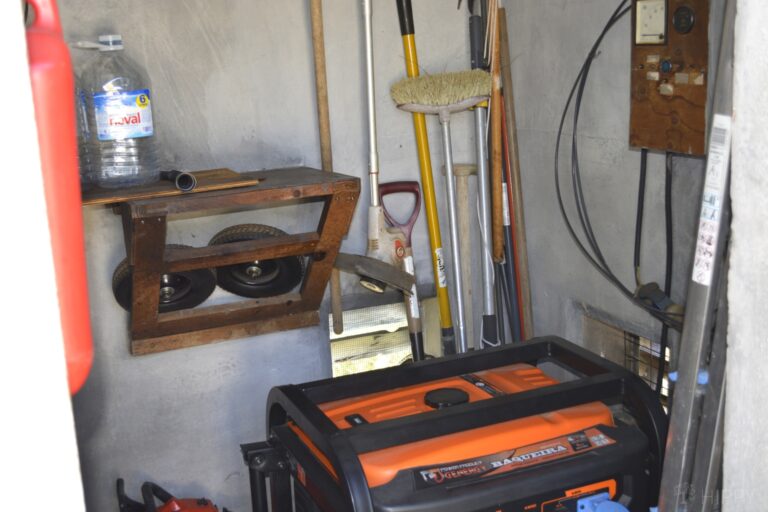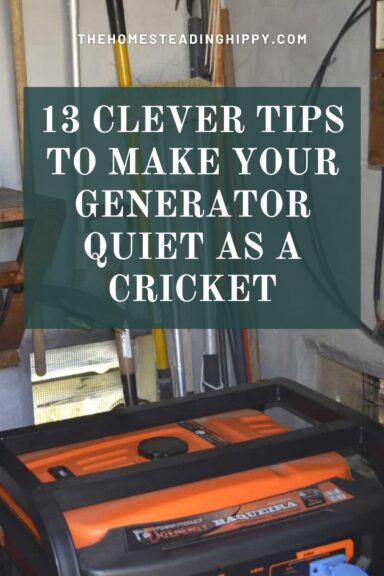If you’re a homesteader, you’ve got to have a generator. Whether you need power somewhere out on the property for doing repairs, for countless other jobs, or you are just coping with the loss of electricity from a storm, disaster, or accident, you can’t be without one.

But generators are just freaking loud! It’s enough to drive you crazy, annoy your family, tick off your neighbors, hurt your hearing, and, most worryingly of all, attract thieves who’ll definitely know you’ve got it if they can hear it.
But you don’t have to put up with a noisy rattletrap generator if you know how to make it quiet. Keep reading, and I’ll share with you some proven tips for making your generator really really quiet.
Move the Generator Away from Living Areas
The first solution is the most obvious and one you should try if your generator is portable. Simply move it away from your home or any other areas of human habitation. The farther away it is, the quieter it will seem, even though it’s still emitting the same amount of noise.
If you can put any obstacles between you and the generator, so much the better, and that’s another proven technique as we will learn.
Obviously, there might be a security risk with this technique if there are other people around or if you just can’t have your generator out of sight for whatever reason.
Position Exhaust Away from People
Another easy trick, but one that’s really easy to forget, too! Position the generator so that the exhaust pipe is facing away from you, or move the pipe itself if it can be repositioned.
This is a major source of intense noise, so aiming it away from you so the noise isn’t actually hitting you will help a little bit, especially with really loud models.
Use a Water Muffler
Equipping your generator with a water muffler bucket is quick, easy, adaptable, and massively effective.
A water muffler? Basically, it’s nothing but a bucket of water that you route the exhaust pipe into. When the gases have to discharge into the water, they are cooled and radically slowed down by the pressure of the water.
And don’t worry; the gases will bubble to the top of the water, evacuating from the generator as normal and allowing it to function safely.
Obviously, you need to be careful about having a large bucket of water near the generator, and you must make sure that the water cannot flow up the pipe and into the engine.
A great trick is to attach a length of flexible hose to the exhaust pipe using hose clamps and then sink that into the bucket, which will let you keep it further away, too.
It’s one of my favorite methods for quickly quieting down a loud generator in a hurry.
Use Only as Much Power as You Need
Another basic but practical tip, and one that’s easy to forget. As a rule of thumb, any generator that uses liquid fuel will be noisier when it is operating at high output.
If you don’t need all of the power you can muster, reduce the output assuming it is manually controllable. This will usually save you several decibels’ worth of noise.
Many modern generators that have automatic controllers, which respond to the demands of the generator, will take care of this for you if you’re only using a fraction of its total capacity.
Turn on Eco-Mode, if Your Model Has It
Likewise, many generators that have fuel and energy-saving technology built into them, commonly known as eco mode, tend to run considerably quieter when this functionality is engaged.
Once again, newer generators will usually take care of this automatically and give you an indicator light or icon on the panel that eco mode is operational.
But if yours doesn’t automatically engage, make sure you turn it on if you can to keep the noise down, if nothing else. You’ll also save a little bit of fuel!
Reduce Vibration
Believe it or not, a big part of the noise associated with a generator comes from vibration. If you can reduce this vibration, you can tame the noise a little bit because parts won’t be vibrating against each other and into the surface the generator is placed on.
Good ways to do this include tightening down the feet, securing loose bolts and other fasteners using a thread locker if required, placing the generator on a soft surface, or using a heat-resistant mat to set it on if you can’t place it on a soft surface.
Make sure to double-check that loose parts like cowlings, casings, shrouds, and any other components that you might have attached are tight and not wiggling – and especially not banging into other parts. A good once-over can make a significant difference in noise levels.
Try a Different Fuel
As a rule of thumb, different kinds of fuel tend to produce different levels of noise. Diesel is generally the loudest, and gasoline is right behind it.
Propane tends to be the quietest of the liquid fuels, so if you have a choice of which generator to use, go with propane, or if you have a dual-fuel model, fill it up with propane instead of gas or diesel.
Again, this tends to be a fractional improvement, but in conjunction with several of the other techniques on our list, it can add up to quite a difference!
Deflect Noise with Panels
This is a method that works so well, and is so cheap and so quick, I can still hardly believe that it is real.
If you place four panels around your generator, tilting inward on it to make a sort of pyramid or ziggurat shape, you can slash noise levels by 10 decibels or even more. And if you aren’t familiar with how decibels scale, let me tell you, that is huge!
The only thing is that you can’t block the exhaust, and that you should be careful to keep the panels out of contact with hot parts on the generator. Use plywood or, in a pinch, and if there’s no risk of it getting wet, sheetrock for the purpose.
Check out the video above for proof and a demonstration of how to do it.
Use a Baffle Box
For more substantial, full-time noise deflection or for damping a generator that is immobile, you can build a baffle box around it.
When you visit a link in this article that takes you to a different website where you can purchase something, I may earn a commission. Read my full disclosure for more details.
Baffle boxes are simple, consisting of an open-top or semi-open-top box that has noise-absorbing materials on the inside like rubber, fireproof insulation, or certain kinds of heat-resistant foam.
Place it around the generator, allowing plenty of airflow and the required amount of standoff on each side, and enjoy a quieter life. These work so well both because they absorb a certain amount of sound and deflect the rest.
You can buy these for your generator or easily build your own if you are crafty.
Build a Generator Shed
If you are using a generator in the same place over and over again, or just want to protect the one you have outside at all times, consider a generator shed for it.
It’s exactly what it sounds like, and typically consists of a simple structure, a vented roof or fixed exhaust pipe, and a concrete pad for the generator to sit on. It’s a great way to improve the longevity of your generator and muffle a ton of noise.
The downside is that they can be a lot more costly to construct and implement compared to other, simpler solutions on our list here.
Upgrade the Muffler
If your generator seems particularly noisy, or noisier than it used to be anyway, you might just need to upgrade its muffler.
A damaged or defective muffler can radically increase noise levels. Chances are you can purchase an aftermarket model for your generator or adapt one to it, but you might need to look into a custom fabricated unit if those aren’t an option.
Also, don’t forget to check out the water muffler tip above!
Keep Your Genny Maintained
A well-maintained generator is a quieter generator. A lack of maintenance contributes to wear, looser tolerances, and increased noise.
Always keep yours maintained according to the manufacturer’s specifications detailed in the manual for your unit, and if you have any doubts, have it serviced by a dealer or small engine shop.
If All Else Fails, Get a Newer, Quieter Generator
Sometimes, you are just flat-out going to be stuck with an exceptionally loud generator. If you try everything on this list, or they prove to be insufficient for your needs, you should consider upgrading your generator, especially if you use it all the time.
It will be well worth the money, especially considering the toll you will be saving on your ears, your sanity, and the happiness of your family and neighbors.

Tim is a farm boy with vast experience on homesteads, and with survival and prepping. He lives a self-reliant lifestyle along with his aging mother in a quiet and very conservative little town in Ohio. He teaches folks about security, prepping and self-sufficiency not just through his witty writing, but also in person.
Find out more about Tim and the rest of the crew here.

The starting question should be where is the noise coming from. How much of the noise is coming from the exhaust and how much from the generator operation. Does anyone have any experience with this?